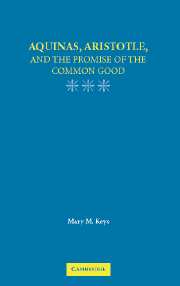Book contents
- Frontmatter
- Contents
- Acknowledgments
- PART I VIRTUE, LAW, AND THE PROBLEM OF THE COMMON GOOD
- PART II AQUINAS'S SOCIAL AND CIVIC FOUNDATIONS
- 3 Unearthing and Appropriating Aristotle's Foundations: From Three Anglo-American Theorists Back to Thomas Aquinas
- 4 Reinforcing the Foundations: Aquinas on the Problem of Political Virtue and Regime-Centered Political Science
- 5 Finishing the Foundations and Beginning to Build: Aquinas on Human Action and Excellence as Social, Civic, and Religious
- PART III MORAL VIRTUES AT THE NEXUS OF PERSONAL AND COMMON GOODS
- PART IV POLITICS, HUMAN LAW, AND TRANSPOLITICAL VIRTUE
- Works Cited
- Index
5 - Finishing the Foundations and Beginning to Build: Aquinas on Human Action and Excellence as Social, Civic, and Religious
Published online by Cambridge University Press: 25 July 2009
- Frontmatter
- Contents
- Acknowledgments
- PART I VIRTUE, LAW, AND THE PROBLEM OF THE COMMON GOOD
- PART II AQUINAS'S SOCIAL AND CIVIC FOUNDATIONS
- 3 Unearthing and Appropriating Aristotle's Foundations: From Three Anglo-American Theorists Back to Thomas Aquinas
- 4 Reinforcing the Foundations: Aquinas on the Problem of Political Virtue and Regime-Centered Political Science
- 5 Finishing the Foundations and Beginning to Build: Aquinas on Human Action and Excellence as Social, Civic, and Religious
- PART III MORAL VIRTUES AT THE NEXUS OF PERSONAL AND COMMON GOODS
- PART IV POLITICS, HUMAN LAW, AND TRANSPOLITICAL VIRTUE
- Works Cited
- Index
Summary
[S]ince reason produces certain things by way of making, in which case the operation goes out into external matter … and other things by way of action, in which case the operation remains with the agent, as when one deliberates, chooses, wills, and performs other similar acts pertaining to moral science, it is obvious that political science, which is concerned with the ordering of men, is not comprised under the sciences that pertain to making or the mechanical arts, but under the sciences that pertain to action, which are the moral sciences.
Aquinas, Proemium to the Commentary on Aristotle's “Politics” (6 [6])Thus far in Part II we have seen Aquinas follow or rather precede the three Anglo-American theorists of Part I, in learning from Aristotle's ethics and political theory and especially from the Philosopher's political-philosophic foundations. In Chapter 3 we observed Aquinas unearthing and appropriating Aristotle's argument for the naturalness of social and political life for human beings, an argument that seems in turn to entail the conclusion that humans by nature seek to participate in the common good of a just social order and a flourishing civic community, although any particular political community has only a relatively natural status vis-à-vis its members. In Chapter 4 we saw Aquinas comment on Aristotle's second foundation, the argument in Book III of the Politics supporting the centrality to political theory of regimes, citizenship, and civic virtue.
- Type
- Chapter
- Information
- Aquinas, Aristotle, and the Promise of the Common Good , pp. 116 - 140Publisher: Cambridge University PressPrint publication year: 2006



